For very different reasons, 2018 will be a standout year for all growers. From the tramlines was first started to give a real time, on the ground update from Ireland’s tillage fields. Growers from areas around the island of Ireland were asked to partake for the year.
Great attention was given to ensure that the correct geographical spread was achieved in order to give an accurate reflection of the island’s tillage industry.
On a weekly basis, growers from western areas were featured alongside growers from more intensive eastern locations. This was an attempt to highlight the variability in conditions which Ireland’s tillage farmers contend with. 2018 was a good example of this.
A late spring was experienced by virtually all growers. Those in the south, midlands and east had to contend with heavy snow, while those in the southwest, west and north were delayed due to wet conditions.
With each passing week, cropping options became more and more limited, leading to an increase in spring barley area. The summer drought then hit all growers to some degree, with those in the east and south faring worst.
Crop development was severely affected in those areas, but many western and north-western areas received some amount of rain, which helped crops greatly. Potato growth was also affected in the northwest but not as severely as in other parts of the country.

Jamie ranking lifting main crop Rooster potatoes in excellent conditions with his Grimme Varitron 220 harvester.
Autumn harvest
The harvest was a smooth affair for most, with rain stoppages confined to the northwest and west. Yields were significantly back in parts of the east, but some crops yielded a lot better than anticipated even in those areas.
Straw and grain prices largely compensated for lower yields. Yields in the southwest, west and northwest ranged from average to above average, but the harvest was tricky, particularly in the north.
The autumn can only be described as perfect for all growers as the winter crop planting for 2019 got off to an ideal start. Potato harvesting, while later than normal, has also enjoyed a good run but the last of it is proving tricky.
We spoke with all 12 growers to get their thoughts on the year.
Martin Hoste, Clonee, Co Meath

Martin Hoste, Clonee, Co Meath.
“We left 28 degree temperatures in Cape Town last February to come back home, little did we know we were in for a hurricane, two batches of snow and a heat wave” explains Martin.
Martin’s year got off to a slow start due to heavy snow. Drought conditions followed soon after.
He feels his crops missed the worst effects of the drought however, due to his eco-tillage system and the use of liquid nitrogen.
Yields of winter wheat and oilseed rape were close to normal, while his beans and spring barley yields were significantly back. Conditions in autumn were ideal for sowing and Martin would class 2018 as a good one.
High: Martin’s high was that another year passed of good health for him and his family.
Low: The snow was a low point of the year as they were locked up for four days.
Stephen Collins, Mogeely,
Co Cork

Stephen Collins, Mogeely, Co Cork.
“It was a year where we didn’t have a spring” Stephen explains. In his area, the weather went from wet, snowy conditions, straight into a hot, dry summer.
Stephen was fearful for much of the summer as to the effects that late planting and dry weather would have on his yields.
However, his crops performed much better than expected and, coupled with good weather, meant the harvest was a joy.
He then had an ideal autumn and sowing was completed in excellent conditions. 2018 will be remembered as a relatively good year, despite all of the obstacles that the weather threw at him.
High: The performance of his spring barley, in the context of the difficult growing year, was a highlight.
Low: The weather and workload during the month of April was a low point of the year. “It was a challenging month” he said.
Richard Kane, Limavady,
Co Derry

Richard Kane, Limavady,
Co Derry.
“It’s been a strange one, with a lot of ups and downs” says Richard. The year got off to a late start due to wet conditions.
“We weren’t sowing until mid-April as it hadn’t stopped raining in two and a half years” he joked.
Six weeks of good weather in May and June helped improve ground conditions immensely.
The harvest was very tricky with high grain drying and straw turning costs, he explains.
However, better prices and reasonable yields made it well worth the effort. Autumn sowing went very smoothly. As a result, 2018 will be remembered as a good one.
High: Richard invested in a precision GPS system this year which has been a game changer for him.
Low: He lost 140 acres of winter oilseed last autumn due to the poor weather. This was the biggest crop loss ever suffered on his farm.
Larry Doyle, Busherstown,
Co Carlow

Larry Doyle, Busherstown,
Co Carlow.
“Every year throws up different challenges and we have to cope.” That was Larry Doyle’s perspective on 2018 and its challenges. “As I look back on 2018 I see spring, or the absence of a spring, as being the stand-out feature of the year. We went straight from winter to summer – there was no spring. I had not seen that before.”
High: His highlight of 2018 was his break from farming. He spent a few weeks touring the north east of the US and up into Canada. It was not a farming trip, but he did not miss much of what was happening on the land.
Low: The negative aspect has to be the uncertainty. Much of this is politically based with Brexit, Trump, CAP, climate change and loss of pesticide being amongst the greater concerns for the future.
We should be entitled to a level playing field for trade, Larry concluded.
John C Byrne, Clonmel,
Co Tipperary

John C Byrne, Clonmel,
Co Tipperary.
“We must take whatever type of year we get, that’s what we signed up for in farming.” This is how John C Byrne summarised 2018 and its impact on his farm.
While every year brings its own challenges, John’s lingering memory of 2018 is likely to be the drought and the heat of summer.
While the year has been so different in so many ways, the heat, dryness and the ability to work any day you wanted will be his abiding memory of 2018
High: “Price and its financial benefit” was John’s response when asked what he considered to be his main highlight of 2018.
Low: The reply on the negative factors was more complex. “There are so many uncertainties at the moment”, John replied. Amongst these he listed Brexit, CAP negotiations, climate change and carbon constraints and the ongoing hypocrisy in the EU on GM and pesticide concerns.
Jamie Rankin, Cloon,
Co Donegal

Jamie Rankin, Cloon,
Co Donegal .
“We’d take another 2018 no bother” says Jamie as he recalls the good weather in Donegal over the past year. Spring arrived around mid-April on Jamie’s farm and once the weather settled, it remained good until August.
The summer drought proved a challenge due to the need to irrigate potato crops, but apart from this, the dry weather was welcomed.
Grain fill was helped immensely by the prolonged sunshine. The harvest went reasonably well, with just a few stoppages due to rain. The autumn was near perfect for potato lifting and sowing. 2018 will be remembered as a very good year in Donegal.
High: Jamie explains that his high has to be the good weather, “We haven’t had a good harvest in four years, it was a pleasure to cut grain in good conditions”.
Low: Having to irrigate potato crops during the year was a low point.
Andrew Bergin, Athy,
Co Kildare

Andrew Bergin, Athy,
Co Kildare.
“The first seven months of this year were pretty extreme” Andrew remarks. His spring was incredibly late, which limited spring crop options. The summer drought also hit his farm hard. While his crops initially appeared to be coping well, they eventually succumbed to the dry weather.
“It was an easy harvest to save,” he said, citing the good weather, coupled with low grain and straw volumes. Grain quality was also an issue this year, with no grain making malting quality. The strong market was a big help to mitigate against this. The autumn weather can only be described as a dream, he explains. While it was a tough year, it won’t be remembered as a disastrous one.
High: The ease of the work in the autumn was a highlight of this year.
Low: Seeing his crops not reaching their potential was a low point of the year.
Simon Best, Poyntzpass,
Co Down

Simon Best, Poyntzpass,
Co Down.
“It’s been a game of two halves” remarks Simon when discussing 2018. After the weather broke in August 2017, things didn’t settle until April of this year. This meant that spring planting was delayed. “The summer was as hot and dry as I can remember” explains Simon as he describes how the good weather in June and July affected his crops.
The harvest went very smoothly, with good ground conditions and low grain moistures. He enjoyed a similar run of weather in autumn and all crops now look excellent.
Despite the bad start, it turned into an exceptional year weather wise and for that reason, 2018 will be remembered as a good year.
High: The weather experienced through the summer months was a high point in Simon’s farming year.
Low: The effect that the late spring and hot, dry weather had on crop, straw and forage yields was a low point.
Ronan Barron, Tralee,
Co Kerry

Ronan Barron, Tralee,
Co Kerry.
“It was a very slow start to the year, the weather wasn’t there” said Ronan when describing 2018. Spring field work on winter crops was around a month late, he said. Spring planting was also delayed by a month due to wet conditions.
There was always a concern that the crops wouldn’t yield because of the dry weather during the summer, remarks Ronan. However, a lot of his crops were sown on heavier ground, which was able to hold the moisture throughout the year. As a result, his grain and straw yields were very good.
Autumn sowing also went very smoothly. “2018 worked out to be a reasonable year financially,” he said.
High: The good yields of his crops, despite the tough growing year, was a high for Ronan.
Low: The long wait for spring to arrive was the low point of the year.
Julian Ashmore, Ballycarney, Co. Wexford

Julian Ashmore, Ballycarney, Co. Wexford.
“A year of extremes” is how Julian describes 2018. The snow in March was one of the stand out moments of the year. “We were planting the majority of our spring barley in May, it was extremely late,” he explains.
While the drought had a big impact on yields, the good weather made field work a joy. “The weather that we got in October was the weather that we should have got in March and April” he said.
Despite the challenges, Julian would still class this year as a reasonable one, largely due to strong grain and straw prices.
High: The good grain price was a highlight of the year, it helped compensate for his lower yields.
Low: The snow in March was the low point of the year for Julian due to its subsequent knock on effects on the cropping season.
Eugene Ryan, Portlaoise,
Co Laois

Eugene Ryan, Portlaoise,
Co Laois.
“It’s been a challenging year, from multiple points of view,” said Eugene as he describes 2018. The long, wet winter, followed by the cold, hard spring and the dry, hot summer led to an extraordinary cropping season. However, his winter barley still preformed reasonably well and most of his spring barley passed for malting.
A kind back end was perfect for autumn sowing and his winter crops are looking excellent. Eugene explains that 2018 won’t be remembered as a particularly bad year in the end, with grain and straw prices softening the blow.
High: The ease of the harvest was Eugene’s highlight of the year, “The past number of harvests had been a challenge, so good weather was welcomed”.
Low: The performance of his spring oilseed rape was the low point of the year. The crop yielded around 60% below typical yields for his farm.
John Daly, Ballinasloe,
Co Galway

John Daly, Ballinasloe,
Co Galway.
“If every year was as good as this, we’d be happy” said John as he looks back on 2018. While spring got off to a late start, he had experienced similar springs in Galway before.
However, the summer was exceptionally dry and his cereal and grass crops did suffer. The harvest was straight–forward, with only one real break in the weather.
Grain and straw volumes were slightly below average but specific weights were high, as were prices.
He has never seen an autumn so good before, with ground work still ongoing this week. 2018 will be remember as a good year for John.
High: Cutting and lifting pit silage in glorious weather conditions was a highlight for John this year.
Low: Running out of grass and feeding silage in the end of July/early August was a low point of the year.
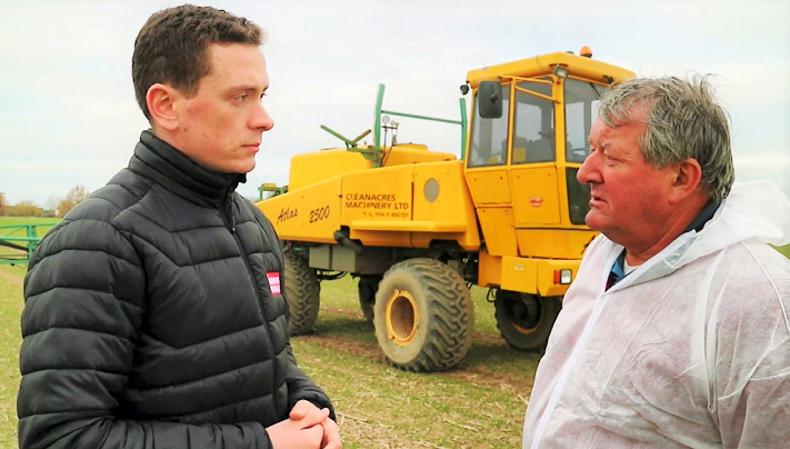
Stephen Robb speaks to Martin Hoste, one of the growers who contributed to from the tramlines.
We would like to extend a warm thank you to all of the growers for their contributions throughout the year. From the tramlines will return in 2019.
Read more
Smallest grain harvest in 23 years
Non-GM and organic identified as key EU plant protein growth areas
For very different reasons, 2018 will be a standout year for all growers. From the tramlines was first started to give a real time, on the ground update from Ireland’s tillage fields. Growers from areas around the island of Ireland were asked to partake for the year.
Great attention was given to ensure that the correct geographical spread was achieved in order to give an accurate reflection of the island’s tillage industry.
On a weekly basis, growers from western areas were featured alongside growers from more intensive eastern locations. This was an attempt to highlight the variability in conditions which Ireland’s tillage farmers contend with. 2018 was a good example of this.
A late spring was experienced by virtually all growers. Those in the south, midlands and east had to contend with heavy snow, while those in the southwest, west and north were delayed due to wet conditions.
With each passing week, cropping options became more and more limited, leading to an increase in spring barley area. The summer drought then hit all growers to some degree, with those in the east and south faring worst.
Crop development was severely affected in those areas, but many western and north-western areas received some amount of rain, which helped crops greatly. Potato growth was also affected in the northwest but not as severely as in other parts of the country.

Jamie ranking lifting main crop Rooster potatoes in excellent conditions with his Grimme Varitron 220 harvester.
Autumn harvest
The harvest was a smooth affair for most, with rain stoppages confined to the northwest and west. Yields were significantly back in parts of the east, but some crops yielded a lot better than anticipated even in those areas.
Straw and grain prices largely compensated for lower yields. Yields in the southwest, west and northwest ranged from average to above average, but the harvest was tricky, particularly in the north.
The autumn can only be described as perfect for all growers as the winter crop planting for 2019 got off to an ideal start. Potato harvesting, while later than normal, has also enjoyed a good run but the last of it is proving tricky.
We spoke with all 12 growers to get their thoughts on the year.
Martin Hoste, Clonee, Co Meath

Martin Hoste, Clonee, Co Meath.
“We left 28 degree temperatures in Cape Town last February to come back home, little did we know we were in for a hurricane, two batches of snow and a heat wave” explains Martin.
Martin’s year got off to a slow start due to heavy snow. Drought conditions followed soon after.
He feels his crops missed the worst effects of the drought however, due to his eco-tillage system and the use of liquid nitrogen.
Yields of winter wheat and oilseed rape were close to normal, while his beans and spring barley yields were significantly back. Conditions in autumn were ideal for sowing and Martin would class 2018 as a good one.
High: Martin’s high was that another year passed of good health for him and his family.
Low: The snow was a low point of the year as they were locked up for four days.
Stephen Collins, Mogeely,
Co Cork

Stephen Collins, Mogeely, Co Cork.
“It was a year where we didn’t have a spring” Stephen explains. In his area, the weather went from wet, snowy conditions, straight into a hot, dry summer.
Stephen was fearful for much of the summer as to the effects that late planting and dry weather would have on his yields.
However, his crops performed much better than expected and, coupled with good weather, meant the harvest was a joy.
He then had an ideal autumn and sowing was completed in excellent conditions. 2018 will be remembered as a relatively good year, despite all of the obstacles that the weather threw at him.
High: The performance of his spring barley, in the context of the difficult growing year, was a highlight.
Low: The weather and workload during the month of April was a low point of the year. “It was a challenging month” he said.
Richard Kane, Limavady,
Co Derry

Richard Kane, Limavady,
Co Derry.
“It’s been a strange one, with a lot of ups and downs” says Richard. The year got off to a late start due to wet conditions.
“We weren’t sowing until mid-April as it hadn’t stopped raining in two and a half years” he joked.
Six weeks of good weather in May and June helped improve ground conditions immensely.
The harvest was very tricky with high grain drying and straw turning costs, he explains.
However, better prices and reasonable yields made it well worth the effort. Autumn sowing went very smoothly. As a result, 2018 will be remembered as a good one.
High: Richard invested in a precision GPS system this year which has been a game changer for him.
Low: He lost 140 acres of winter oilseed last autumn due to the poor weather. This was the biggest crop loss ever suffered on his farm.
Larry Doyle, Busherstown,
Co Carlow

Larry Doyle, Busherstown,
Co Carlow.
“Every year throws up different challenges and we have to cope.” That was Larry Doyle’s perspective on 2018 and its challenges. “As I look back on 2018 I see spring, or the absence of a spring, as being the stand-out feature of the year. We went straight from winter to summer – there was no spring. I had not seen that before.”
High: His highlight of 2018 was his break from farming. He spent a few weeks touring the north east of the US and up into Canada. It was not a farming trip, but he did not miss much of what was happening on the land.
Low: The negative aspect has to be the uncertainty. Much of this is politically based with Brexit, Trump, CAP, climate change and loss of pesticide being amongst the greater concerns for the future.
We should be entitled to a level playing field for trade, Larry concluded.
John C Byrne, Clonmel,
Co Tipperary

John C Byrne, Clonmel,
Co Tipperary.
“We must take whatever type of year we get, that’s what we signed up for in farming.” This is how John C Byrne summarised 2018 and its impact on his farm.
While every year brings its own challenges, John’s lingering memory of 2018 is likely to be the drought and the heat of summer.
While the year has been so different in so many ways, the heat, dryness and the ability to work any day you wanted will be his abiding memory of 2018
High: “Price and its financial benefit” was John’s response when asked what he considered to be his main highlight of 2018.
Low: The reply on the negative factors was more complex. “There are so many uncertainties at the moment”, John replied. Amongst these he listed Brexit, CAP negotiations, climate change and carbon constraints and the ongoing hypocrisy in the EU on GM and pesticide concerns.
Jamie Rankin, Cloon,
Co Donegal

Jamie Rankin, Cloon,
Co Donegal .
“We’d take another 2018 no bother” says Jamie as he recalls the good weather in Donegal over the past year. Spring arrived around mid-April on Jamie’s farm and once the weather settled, it remained good until August.
The summer drought proved a challenge due to the need to irrigate potato crops, but apart from this, the dry weather was welcomed.
Grain fill was helped immensely by the prolonged sunshine. The harvest went reasonably well, with just a few stoppages due to rain. The autumn was near perfect for potato lifting and sowing. 2018 will be remembered as a very good year in Donegal.
High: Jamie explains that his high has to be the good weather, “We haven’t had a good harvest in four years, it was a pleasure to cut grain in good conditions”.
Low: Having to irrigate potato crops during the year was a low point.
Andrew Bergin, Athy,
Co Kildare

Andrew Bergin, Athy,
Co Kildare.
“The first seven months of this year were pretty extreme” Andrew remarks. His spring was incredibly late, which limited spring crop options. The summer drought also hit his farm hard. While his crops initially appeared to be coping well, they eventually succumbed to the dry weather.
“It was an easy harvest to save,” he said, citing the good weather, coupled with low grain and straw volumes. Grain quality was also an issue this year, with no grain making malting quality. The strong market was a big help to mitigate against this. The autumn weather can only be described as a dream, he explains. While it was a tough year, it won’t be remembered as a disastrous one.
High: The ease of the work in the autumn was a highlight of this year.
Low: Seeing his crops not reaching their potential was a low point of the year.
Simon Best, Poyntzpass,
Co Down

Simon Best, Poyntzpass,
Co Down.
“It’s been a game of two halves” remarks Simon when discussing 2018. After the weather broke in August 2017, things didn’t settle until April of this year. This meant that spring planting was delayed. “The summer was as hot and dry as I can remember” explains Simon as he describes how the good weather in June and July affected his crops.
The harvest went very smoothly, with good ground conditions and low grain moistures. He enjoyed a similar run of weather in autumn and all crops now look excellent.
Despite the bad start, it turned into an exceptional year weather wise and for that reason, 2018 will be remembered as a good year.
High: The weather experienced through the summer months was a high point in Simon’s farming year.
Low: The effect that the late spring and hot, dry weather had on crop, straw and forage yields was a low point.
Ronan Barron, Tralee,
Co Kerry

Ronan Barron, Tralee,
Co Kerry.
“It was a very slow start to the year, the weather wasn’t there” said Ronan when describing 2018. Spring field work on winter crops was around a month late, he said. Spring planting was also delayed by a month due to wet conditions.
There was always a concern that the crops wouldn’t yield because of the dry weather during the summer, remarks Ronan. However, a lot of his crops were sown on heavier ground, which was able to hold the moisture throughout the year. As a result, his grain and straw yields were very good.
Autumn sowing also went very smoothly. “2018 worked out to be a reasonable year financially,” he said.
High: The good yields of his crops, despite the tough growing year, was a high for Ronan.
Low: The long wait for spring to arrive was the low point of the year.
Julian Ashmore, Ballycarney, Co. Wexford

Julian Ashmore, Ballycarney, Co. Wexford.
“A year of extremes” is how Julian describes 2018. The snow in March was one of the stand out moments of the year. “We were planting the majority of our spring barley in May, it was extremely late,” he explains.
While the drought had a big impact on yields, the good weather made field work a joy. “The weather that we got in October was the weather that we should have got in March and April” he said.
Despite the challenges, Julian would still class this year as a reasonable one, largely due to strong grain and straw prices.
High: The good grain price was a highlight of the year, it helped compensate for his lower yields.
Low: The snow in March was the low point of the year for Julian due to its subsequent knock on effects on the cropping season.
Eugene Ryan, Portlaoise,
Co Laois

Eugene Ryan, Portlaoise,
Co Laois.
“It’s been a challenging year, from multiple points of view,” said Eugene as he describes 2018. The long, wet winter, followed by the cold, hard spring and the dry, hot summer led to an extraordinary cropping season. However, his winter barley still preformed reasonably well and most of his spring barley passed for malting.
A kind back end was perfect for autumn sowing and his winter crops are looking excellent. Eugene explains that 2018 won’t be remembered as a particularly bad year in the end, with grain and straw prices softening the blow.
High: The ease of the harvest was Eugene’s highlight of the year, “The past number of harvests had been a challenge, so good weather was welcomed”.
Low: The performance of his spring oilseed rape was the low point of the year. The crop yielded around 60% below typical yields for his farm.
John Daly, Ballinasloe,
Co Galway

John Daly, Ballinasloe,
Co Galway.
“If every year was as good as this, we’d be happy” said John as he looks back on 2018. While spring got off to a late start, he had experienced similar springs in Galway before.
However, the summer was exceptionally dry and his cereal and grass crops did suffer. The harvest was straight–forward, with only one real break in the weather.
Grain and straw volumes were slightly below average but specific weights were high, as were prices.
He has never seen an autumn so good before, with ground work still ongoing this week. 2018 will be remember as a good year for John.
High: Cutting and lifting pit silage in glorious weather conditions was a highlight for John this year.
Low: Running out of grass and feeding silage in the end of July/early August was a low point of the year.

Stephen Robb speaks to Martin Hoste, one of the growers who contributed to from the tramlines.
We would like to extend a warm thank you to all of the growers for their contributions throughout the year. From the tramlines will return in 2019.
Read more
Smallest grain harvest in 23 years
Non-GM and organic identified as key EU plant protein growth areas

























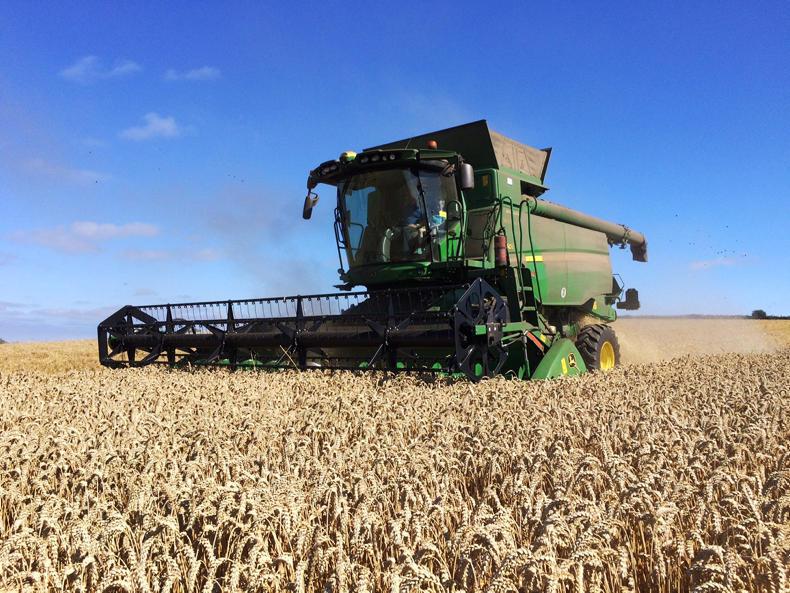


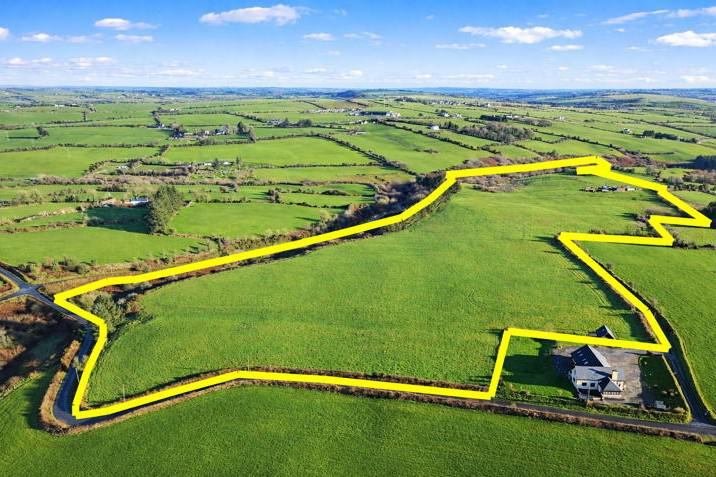
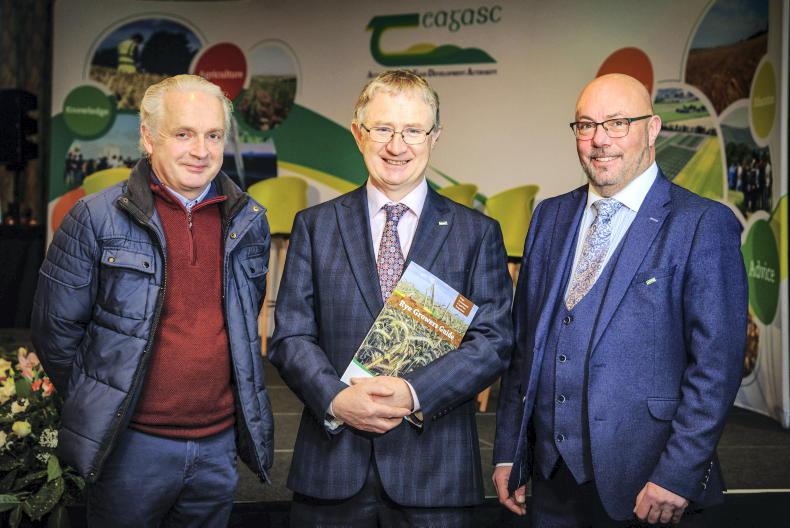
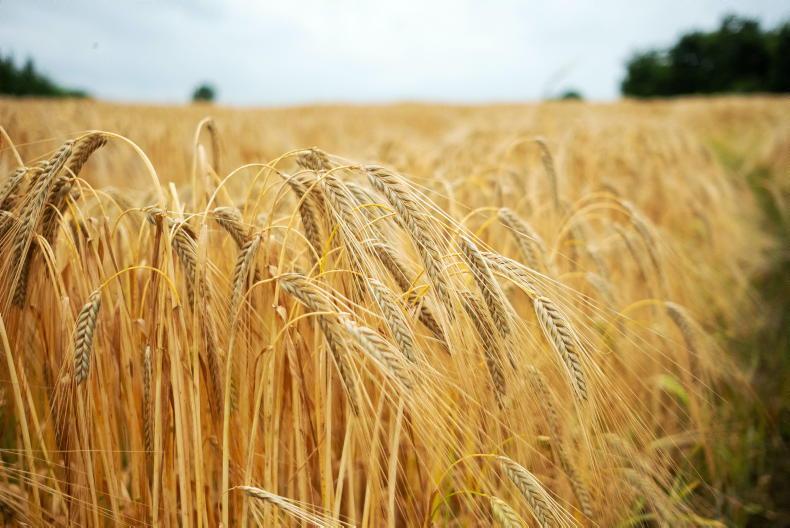
SHARING OPTIONS